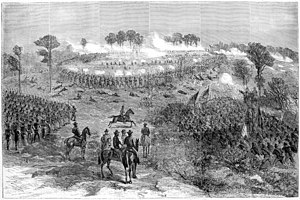Battle of Chaffin's Farm
| Battle of Chaffin's Farm and New Market Heights | |||||||
|---|---|---|---|---|---|---|---|
| Part of the American Civil War | |||||||
 Union assault on Fort Harrison, September 29 (after a sketch by William Waud) |
|||||||
|
|||||||
| Belligerents | |||||||
|
|
|
||||||
| Commanders and leaders | |||||||
| Benjamin F. Butler |
Robert E. Lee Richard S. Ewell |
||||||
| Strength | |||||||
| 26,600 | 14,500 | ||||||
| Casualties and losses | |||||||
|
3,372 total 391 killed 2,317 wounded 649 missing/captured |
2,000 total 250 killed 1,250 wounded 500 missing/captured |
||||||
The Battle of Chaffin's Farm and New Market Heights, also known as Laurel Hill and combats at Forts Harrison, Johnson, and Gilmer, was fought in Virginia on September 29–30, 1864, as part of the Siege of Petersburg in the American Civil War.
From the very beginning of the war, Confederate engineers and slave laborers had constructed permanent defenses around Richmond. By 1864, they had created a system anchored south of the capital on the James River at Chaffin's Farm, a large open area at Chaffin's Bluff, both named for a local landowner. This outer line was supported by an intermediate and inner system of fortifications much closer to the capital. In July and August 1864, these lines were tested by Union Lt. Gen. Ulysses S. Grant in offensives designed to attack simultaneously north and south of the James.
On July 27–29, the Army of the Potomac's II Corps under Maj. Gen. Winfield S. Hancock and cavalry under Maj. Gen. Philip Sheridan attacked New Market Heights and Fussell's Mill in the First Battle of Deep Bottom (named for the section of the James River used for the Union crossing). The attacks failed to break through to threaten Richmond or its railroads, but they did cause Confederate Gen. Robert E. Lee to transfer men from the Petersburg fortifications in preparation for the Battle of the Crater on July 31. The Second Battle of Deep Bottom was conducted by Hancock on August 14–20, attacking in almost the same areas once again to draw Confederate troops away from south of the James, where the Battle of Globe Tavern (also known as the Second Battle of the Weldon Railroad) was an attempt to cut the railroad supply lines to Petersburg. The second battle was also a Confederate victory, but it forced Lee to weaken his Petersburg defenses and abandon plans to reinforce his men in the Shenandoah Valley.
...
Wikipedia
